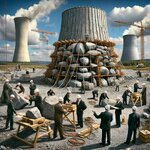Of course I agree that nuclear works. I have told you several times that we should be doing more to build nuclear plants. Why would I be asking for more nuclear plants if I didn't think they worked?
The problem, once again, is that it appears that they do not work well enough to economically they are not popular enough to politically provide our future needs.
FTFY.
This is the claim that you have repeated many times. I have asked you what evidence you have. You never seem to come up with any evidence. You just endlessly repeat the claim. This sure looks to me like, "I want nuclear to solve our problems. I need nuclear to solve our problems. Therefore it will." If you have evidence, please show it.
For the record, I had ChatGPT DALL E (my new toy) draw a picture of government regulators arguing against nuclear construction and idling the equipment. How did it do? If you like it, you can keep it as my gift to you.
 View attachment 45399
View attachment 45399
Certainly this should be the heyday of nuclear construction. We have known for decades that we will need to phase out fossil fuels in the coming years. Nuclear is a mature technology. We have had nuclear power plants for 70 years, which is a longer timespan than the time from the Wright Brother's flight to the landing on the moon. Certainly the technology has had time to mature. The need is urgent. And we still have plenty of diesel fuel to power the equipment and fossil fuels for industrial heating processes to build the components. Surely this should be the day of nuclear.
And yet the production in the United States is dismal. We recently built the first nuclear plant in seven years. Meanwhile many existing plants are being retired. Worldwide we see the same thing. Nobody is making a significant investment in nuclear, except for China, and they are investing in any energy technology under the sun. They are building two new coal plants a week.
. So even they do not see nuclear as the energy of the future. They prefer--uh--coal!
If nuclear is such a bargain, and is restricted only my government and grassroots resistance, why is it that nobody in the world catches on that nuclear is so urgently needed? Why is nobody going all-in?
I have provided multiple links that show the economic woes of nuclear today. Throughout the world, people are having troubles running nuclear economically. And this occurs even when diesel fuel and coal is readily available to build and run the facilities. Where will nuclear be if we need to rely solely on it?
l am for the construction of nuclear plants. Most of us here are for the construction of nuclear plants. But none of that means anything if the people that could build them decide it is not economical to build them.
Yes, we can take it by blind faith that our nuclear god will save us, and that the only thing holding this back is the devil himself, government regulators. But so far I have seen nothing from you that documents this claim is anything other than a faith claim.
Where is your evidence?





